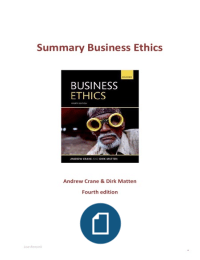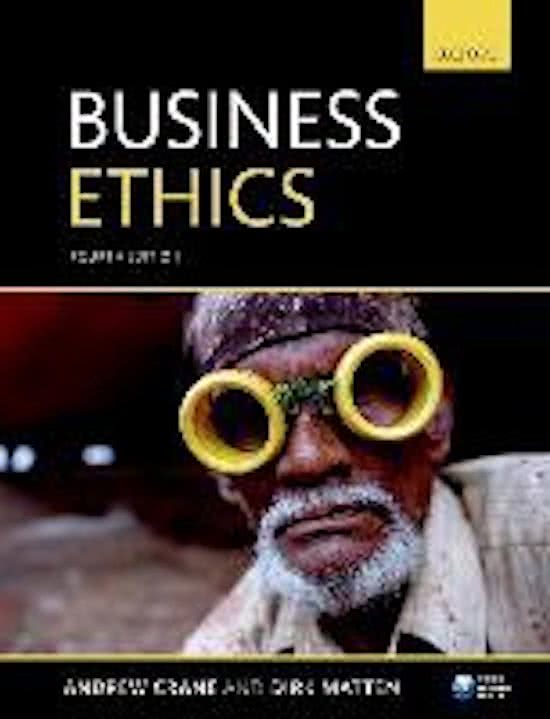Summary Business Ethics
Andrew Crane & Dirk Matten
Fourth edition
Lisa Rensink
1
,Table of Contents
Chapter 1 Introducing Business Ethics .................................................................................................... 3
Chapter 2 Framing Business Ethics .......................................................................................................... 8
Chapter 3 Evaluating Business Ethics .................................................................................................... 14
Chapter 4 Making Decisions in Business Ethics ..................................................................................... 20
Chapter 5 Managing Business Ethics ..................................................................................................... 24
Chapter 6 Shareholders and Business Ethics......................................................................................... 28
Chapter 7 Employees and Business Ethics ............................................................................................ 35
Chapter 8 Consumers and Business Ethics ............................................................................................ 41
Chapter 9 Suppliers, Competitors and Business Ethics ......................................................................... 47
Chapter 10 Civil Society and Business Ethics......................................................................................... 54
Chapter 11 Government, Regulation and Business Ethics .................................................................... 61
Lisa Rensink
2
,Chapter 1 Introducing Business Ethics
What is business ethics?
Business ethics: is the study of business situations, activities, and decisions where issue of right and
wrong are addressed.
Business ethics and the law (fig 1.1 p. 7)
The law is essentially an institutionalization or codification of ethics into specific social rules,
regulations, and proscriptions. They are not equivalent. The law might be said to be a definition of
the minimum acceptable standards of behaviour. However, many morally contestable issues,
whether in business or elsewhere, are not explicitly covered by the law. Similarly, it is possible to
think of issues that are covered by the law, but which are not really about ethics.
business ethics can be said to begin where the law ends. Business ethics is primarily concerned
with those issues not covered by the law, or where there is no definite consensus on whether
something right or wrong. It can lead to legislation. Business ethics is about the grey areas or where
values are on conflict. Equivocal: there can be no definitive right to many business ethics problem.
Defining morality, ethics, and ethical theory
Morality: is concerned with the norms, values, and beliefs embedded in social processes which
define right and wrong for an individual or a community.
Ethics: is concerned with the study of morality and the application of reason to elucidate specific
rules and principles that determine right and wrong for a given situation. These rules and principles
are called ethical theories.
Morality precedes ethics, and ethics precedes ethical theory. All individuals have morality, a basic
sense of right or wrong. Ethics represents an attempt to systematize and rationalize morality,
typically into generalized normative rules that supposedly offer a solution to situations of moral
uncertainty. The outcomes of the codification of these rules are ethical theories.
Why is business ethics important
1. The power and influence of business in society is greater than ever before.
2. Business has the potential to provide a major contribution to our societies, producing the products
and services that we want, providing employment, acting as an engine for economic development.
3. Business malpractices have the potential to inflict enormous harm on individuals on communities
and on the environment.
4. The demands being placed on business to be ethical by its various stakeholders are constantly
becoming more complex and more challenging.
5. Few businesspeople have received formal business ethics education or training, this can help in
ethical decision-making.
6. Ethical violations continue to occur in business, across countries and across sectors.
7. Business ethics can provide us with the ability to assess the benefits and problems associated with
different ways of managing ethics in organization.
8. Business ethics is also extremely interesting in that it provides us with knowledge that transcends
the traditional framework of business studies and confronts us with some of the most important
questions faced by society.
Lisa Rensink
3
,Business ethics in different organizational contexts
Large corporations Small businesses Civil society Public sector
organizations organizations
Main priorities in Financial integrity, Employee issues Delivery of Rule of law,
addressing employee/customer mission to corruption,
ethical issues issues clients; integrity conflicts of
of tactics; interest;
legitimacy and procedural
accountability issues,
accountability
Approach to Formal, public Informal, trust- Informal, value- Formal,
managing ethics relations and/or based based bureaucratic
systems-based
Responsible Shareholders and Owners Donors and General public,
and/or other stakeholders clients higher level
accountable to government
organizations
Main constraints Shareholder Lack of resources Lack of resources Inertia, lack of
orientation; size and attention and formal transparency
and complexity of training
their operations
Globalization: a key context for business ethics?
Race to the bottom: a process whereby MNCs (multinational organizations) pitch developing
countries against each other by allocating foreign direct investment to those countries that can offer
them the most favourable conditions in terms of low tax rates, low levels of environmental
regulation, and restricted workers’ rights. Globalization is the most current and demanding arena in
which corporations have to define and legitimate the rights and wrong of their behaviour.
What is globalization?
Globalization: is a process which diminishes the necessity of a common and shared territorial basis
for social, economic, and political activities, processes and relations. Globalization characterizes
deterritorialization.
The link between social connections and a specific territory has been weakened.
- Technological development: possibility of connecting, interacting and travelling to with people
despite the fact that there are large geographical distances between them.
- Political development: territorial borders are no longer an obstacle.
Globalization and business ethics: a new global space to manage
Globalization defined in terms of the deterritorialization of economic activities is particularly relevant
for business ethics. Three main areas:
1. Cultural issues. Corporations finding themselves confronted with new and diverse, sometimes
contradictory ethical demands. There is still a close connection between the local culture and a
certain geographical region. On the one hand, globalization makes regional difference less important
since it brings regions together and encourages a more uniform global culture. On the other hand
globalization reveals economic, political, and cultural differences and confronts people with them.
2. Legal issues. The more economic transactions lose their connection to a certain regional territory,
the more they escape the control of the respective national governments.
Lisa Rensink
4
, 3. Accountability issues. The more economic activities get deterritorialized, the less governments can
control them, and the less they are open to democratic control by the affected people. Globalization
leads to a growing demand the corporate accountability.
Globalization and business ethics: new local challenges to address
In emerging economies and the developing world where many ethical issues in business are most
pressing, and insights from Asian, African, and Latin American ethical perspectives are therefore
essential for situation business ethics in a truly global context, next to North American perspective.
Ethical impacts of globalization for stakeholders:
Shareholders. Globalization provides potential for greater profitability, but also greater risks. Lack of
regulation of global financial markets, leading to additional financial risks and instability.
Employees. Corporations outsource production to developing countries in order to reduce costs in
global marketplace – this provides jobs, but also raises the potential for exploitation of employees
through poor working conditions.
Consumers. Global products provide social benefits to consumers across the globe, but may also
meet protests about cultural imperialism and westernization. Globalization can bring cheaper prices
to customers, but vulnerable consumers in developing countries may also face the possibility of
exploitation by MNCs.
Suppliers and competitors. Suppliers in developing countries face regulation from MNCs through
supply chain management. Small scale indigenous competitors are exposed to powerful global
players.
Civil society. Global business activity brings the company in direct interaction with local communities
thereby raising the possibility for erosion of traditional community life. Globally achieves pressure
groups emerge with aim to police the corporation in countries where government are weak and
corrupt.
Government and regulation. Globalization weakens governments and increases the corporate
responsibility for jobs, welfare, maintenance of ethical standards, etc. Globalization also confronts
governments with corporations from regions with different cultural expectations about issues such
as bribery, corruption, taxation, and philanthropy.
International variety in approaches to business ethics (fig. 1.7)
Who is responsible for ethical conduct in business?
North America: culture of individualism.
Europe: social control by the collective (overarching institution, usually the state).
Asia: top management (hierarchy is important).
Africa and Latin American: collective matter, head of tribe.
European business ethics tends to focus more on the choice of constraints compared with focusing
on choice within constraints.
Who is the key actor in business ethics?
North America: the corporation.
European: governments, trade unions and corporate associations.
Asia: government and corporations (corporations are state-owned, government and corporations are
interconnected).
Lisa Rensink
5






